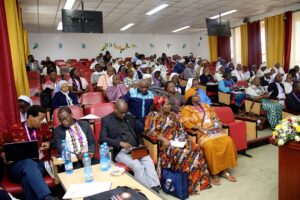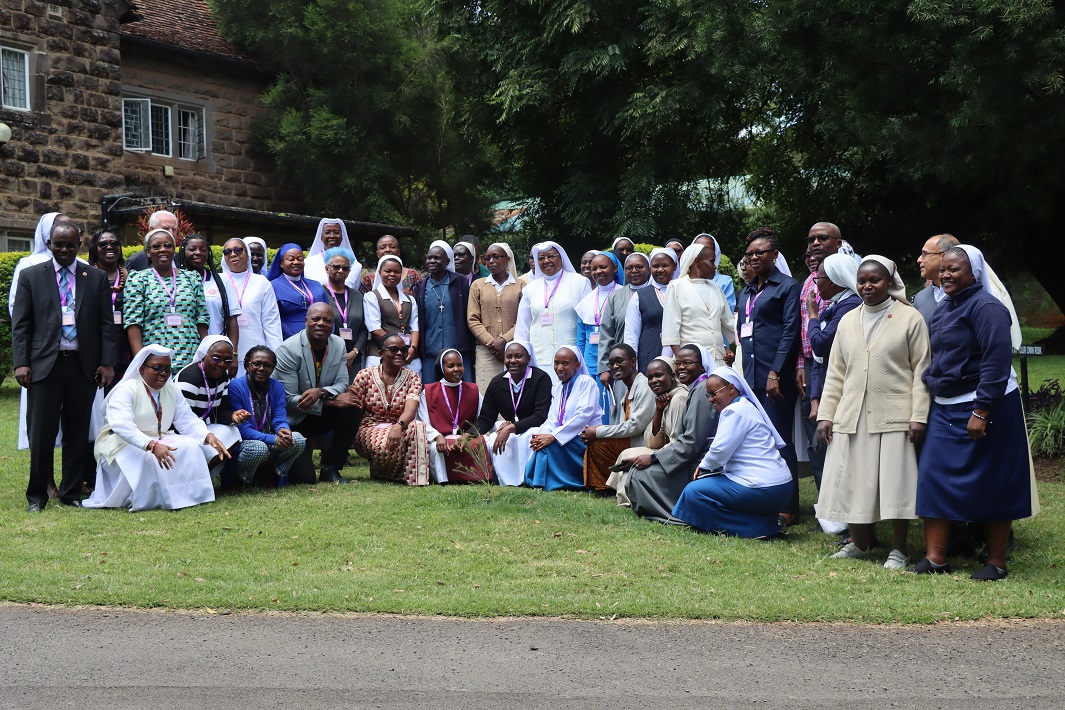By Paschal Norbert
NAIROBI, MARCH 12, 2024 (CISA) – The inaugural International African Women Theological Conference held at Hekima University College (HUC) ended on March 10, 2024, with women calling for a shift toward a theology of ‘Co-Responsibility’ for the Church’s being and action.
Through riveting and nuanced presentations from renowned women theologians including, Sr Prof Teresa Okure, Prof Lisa Cahill, Dr Nora Nonterah, Sr Josée Ngalula, Leocadie Lushombo, Prof Shawn Copeland and Prof Mary Getui among other incredible women scholars, the women explored the four areas of theology: biblical studies, Church history and the silencing of women’s voices, systematic theology- the intersection of faith and culture; canon law and its impact on the leadership of women religious congregations, and synodality.
In answering the question of what women want and how they can be present at the decision-making table, Prof Okure proposed a return to the truth of the Gospel and the teachings that formed the foundation of the Church in order to demolish the unsettling hierarchal structure of the Church.
The Nigerian theologian said, “We need to begin the conversation from the hierarchy of the Church. Hierarchy and Synodality are contradictory in terms. We need to remove hierarchy, which is not gospel and go back to the foundations of the Church as Synodality suggests.”
In her presentation Sr Chin Ngoinso noted that the Church’s hierarchies have often treated competent religious women “as placeholders, ‘spare tires’ in the local parlance, waiting to be ejected when a male counterpart is available.”
The women laity and religious dissected the realities of today, drawing deep reflection from the past on how women have been sidelined in the Church and society while calling for respect and a genuine inclusion in the assembly of God.
However, for Dr Nora Nonterah, one of the few African women delegates at the ongoing Synod on Synodality, the clamour for women to be heard should be viewed as a call for co-responsibility of all the baptized in the Church and not confused with the debate on ordination.
“If we are fighting clericalism, we have to be careful not to make it look like for women to be heard and to be included in decision making in the Church, then they must be ordained,” Dr Nora asserts,noting “The style of Synodality posits that responsibility of the evangelizing lies with all who are baptized, irrespective of their clerical state.”
According to Prof Shawn Copeland, theology should not only be a matter of faith but also a matter of culture, seeking to address the problems of the oppressed and vulnerable and thus, should not make a simplistic reference to the “reign of God.”
“Therefore, Theology must be political,” she stressed.
The four-day conference highlighted women as the backbone of the Church and capable of speaking for themselves. The women noted in the spirit of synodality, the Church must safeguard marginalized women, acknowledge their suffering, ensure their empowerment, and challenge oppressive cultures.
“The synodal Church in Africa is called to seek justice for the vulnerable, reexamine how its own rules and systems oppress women, and take visible action against oppression,” said Sr Carine Tarla Mukep.
“The truth is that women have witnessed the resurrection and continue to do so in many aspects of life. Their presence and contribution are essential in various fields such as family, education, politics, science, and many others. They often bring a unique perspective and valuable wisdom, playing a crucial role in the transformation and evolution of society,” maintained Sr Audrey Ngao Mwale.

They called for introspection into their role in the Church, averring that the debate should not be around the ordained versus the non-ordained but on how co-responsibility of all the faithful, and baptized, enriches the Church.
“Synodality implies recognizing the fact that the Holy Spirit also works in diversity, empowering each one in their differences,” noted Sr Kanza Mbaya Anastasie.
The women scholars advocated for authentic listening by the Church, which according to Sr Mary Jerome Obiorah will naturally lead to a deepening of the Catholic faith.
Sr Josée Ngalula explained, “Listening implies an ethical commitment to journey alongside others, to be open to the experience and wisdom of others. Listening at such a level requires the freedom to be available for whatever the spirit demands.”
In a captivating presentation on new media and synodality by Sr Henriette Anne Owino, the women were also urged to embrace social media platforms as new channels of evangelization and avenues to amplify their voices.
She noted, “The unique voices of African women theologians are crucial in shaping the narrative of synodality, and media platforms offer an exciting avenue to share their perspectives. Religious women should leap into this digital realm, confident that their contributions will have a lasting impact.”
